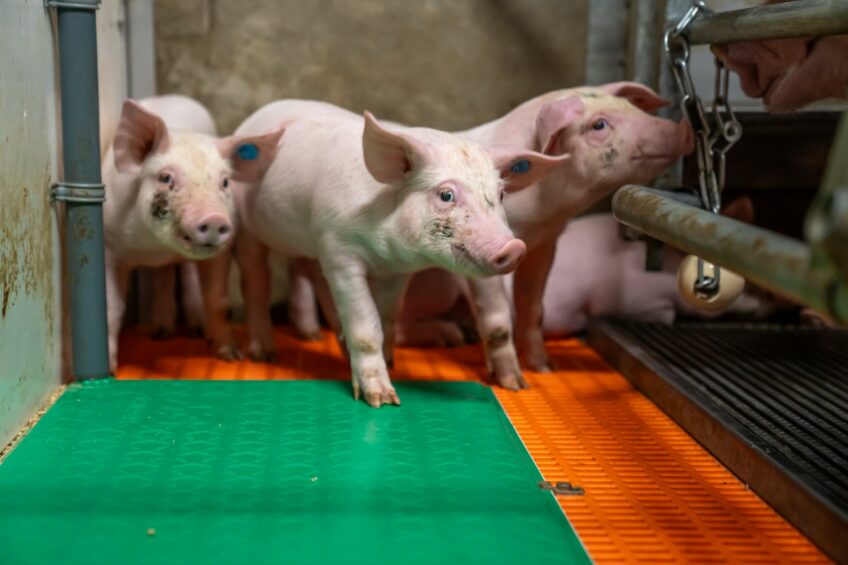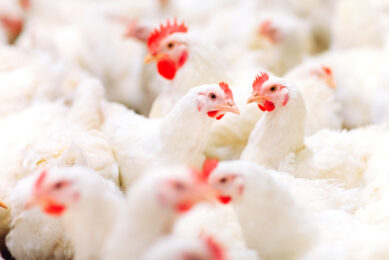Laminaria japonica polysaccharides improve piglet growth performance

Researchers from China and the United States investigated the effects of adding Laminaria japonica polysaccharides to the piglet diet. They evaluated growth performance, fecal digestive enzyme activity, serum biochemical indices, and free amino acids in weaned piglets.
Weaning is a critical stage in the life of piglets. It causes nutritional stress due to sudden cessation of sow’s milk intake as the main source of nutrition for piglets. This dietary change accompanied by the introduction of solid feeds results in decreased feed intake. It also casues impaired digestive capacity, reduced enzyme activity and nutrient absorption in the gut tract. This means it hinders growth performance.
In addition, during the weaning process, the piglet’s gut tract undergoes significant changes in the composition and function of the gut microbiota. It increases the risk of diarrhoea incidence. Laminaria japonica polysaccharides consist of a combination of different sugar residues such as glucose, mannose, fucose, xylose, and glucuronic acid. They exhibit a variety of beneficial biological functions, such as antioxidant, inflammatory, hypoglycemic, hypolipidemic, immune-enhancing, and gut microbiota regulatory activities..
Data collection
The team selected 120 healthy crossbred barrows (Berkshire × Licha Black) for this study. They assigned all piglets randomly to 4 treatments according to their initial body weight. They also supplemented each concentration of Laminaria japonica polysaccharides (0, 100, 200, or 400 mg/kg) to the basal diet. Each treatment had 5 replicates, each replicate had 6 piglets, and the period of the trial was 21 days.
The team measured the average daily gain, average daily feed intake, and gain-to-feed ratio for each replicate. At the end of the experiment, the researchers selected a single piglet from each pen, with a body weight closely aligned with the pen’s average. They obtained blood samples and serum concentrations of free amino acids. The team measured blood ammonia, and serum biochemical indicators encompassing glucose, total cholesterol, triglyceride, high-density lipoprotein cholesterol, low-density lipoprotein cholesterol, and urea nitrogen were measured. Then, fecal samples from the same piglets were collected and indicators of enzyme activity in feces including lipase and α-amylase were measured.
Impact on growth performance
Dietary supplementation of Laminaria japonica polysaccharides at dosages of 200 and 400 mg/kg exhibited a significant enhancement in the average daily gain and average daily feed intake of weaned piglets during days 0 to 21. Improved growth performance was due to the improved digestive enzyme activities in the feces and increased appetite and energy absorption of piglets by the Laminaria japonica polysaccharides supplementation. In addition, Laminaria japonica polysaccharides linearly increased average daily gain and average daily feed intake in piglets as the concentration of Laminaria japonica polysaccharides in the diet increased.
Impact on fecal enzyme activity
Dietary supplementation of Laminaria japonica polysaccharides at dosages of 200 and 400 mg/kg significantly increased the fecal amylase activity of piglets, due to the prebiotic activity of Laminaria japonica polysaccharides which promotes starch digestion and absorption. In addition, dietary Laminaria japonica polysaccharides linearly increased fecal amylase and lipase activities, as the concentration of Laminaria japonica polysaccharides in the diet increased.
Impact on amino acid content in serum
Dietary supplementation of Laminaria japonica polysaccharides at a dosage of 400 mg/kg increased serum histidine and asparagine content in piglets due to increased protein digestion and absorption. In addition, dietary supplementation of Laminaria japonica polysaccharides at a dosage of 200 mg/kg reduced serum methionine and phenylalanine contents compared to piglets fed with Laminaria japonica polysaccharides at a dosage of 100 mg/kg.
Impact on serum biochemical parameters
Dietary supplementation of Laminaria japonica polysaccharides at dosages of 100, 200, and 400 mg/kg did not impact the serum levels of the glucose, total cholesterol, triglyceride, high-density lipoprotein cholesterol, low-density lipoprotein cholesterol, and blood urea nitrogen, and ammonia of weaned piglets. This is probably due to the short experimental period.
Conclusions
The authors concluded that supplementation of 200 and 400 mg/kg of Laminaria japonica polysaccharides to the feed could increase growth performance and the amylase activity in the feces of weaned piglets. This improves the nutrient metabolism ability of weaned piglets.











